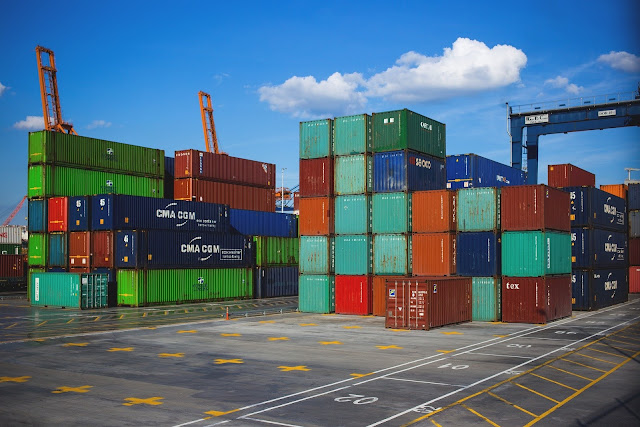By Iain Fraser - Associate Publisher, GEOPoliticalMatters.com
Malaga City (Remote)
Google Indexed at 14.00 on 170620
Despite the best efforts of the global policymakers, we are eight years removed from the global financial crisis and still haven’t enjoyed the broad-based rebound we need to create a world that is safe and more prosperous. Yes, the stimulus provided by the central banks helped stabilize the Western economies, but where’s the catalyst that gets us back to the robust growth we enjoyed in prior decades?
We don’t need to look far because the catalyst exists in the shipping containers coming in and out of a port near you. Simply put, the easiest way to expand the global economy is to expand global trade.
Yes, free trade has come under criticism in the West from populists who blame trade for every lost factory job. In reality, trade took fewer jobs than automation, a force much harder to reverse. So while trade has made for an easy scapegoat, the reality is that cross-border commerce has played an unheralded role in producing the inclusive global prosperity we’ve enjoyed over the past 60 years.
Study after study has proven that trade played a large role over the past half-century in boosting employment, incomes and life spans — as well as associated declines in poverty, child and slave labour and even military conflicts. One study of 40 economies also found that trade increased the purchasing power of lower-income households by about two-thirds, as the poor spend more on heavily traded goods like food and clothing.
That evidence to the contrary, the criticisms aren’t likely to go away. And if advocates of free trade were honest, we’d admit that the global trading system hasn’t kept up with the changes in global commerce. We’d also acknowledge that the long-term benefits have been substantial on a macroeconomic level — but the short-term losses have been felt on a more personal level.
To win over the critics, global trade needs a major reboot. Here are four areas where we can start:
- Reform The WTO
- Bring Trade Laws Into The Digital And Service Eras
- Streamline Customs
- Make Trade More Inclusive
Reform The WTO
Since its inception in 1995, the World Trading Organization has faced its share of criticism: cases take too long and too many countries ignore the notification rules, just to name two. But it’s easy to forget that before its founding, the world trading system was perceived as a club controlled by the world’s biggest economies, one that resisted any change to the status quo. The creation of the WTO accelerated the liberalization of trade and gave countries, big and small, a dispute settlement system guided by law, not power. As a result, more countries have been willing to bring their grievances to the WTO.
The WTO isn’t perfect, but the global trading system needs a strong governing body at its core. And the WTOs rule-based system provides the predictability and accountability that businesses need before they will invest. Given that, the WTO should be reformed, not replaced. The first step would be for the WTO to reform the transparency and notification system, and speed up the dispute settlement process.
Bring Trade Laws Into The Digital And Service Eras
Whether regional, global or bilateral, many of today’s trade agreements were written in an era where manufacturing drove the global economy. Today, the service industry is a much bigger force — and services such as information technology, logistics, architecture, law and accounting now trade easily across borders.
What’s more, many forms of commerce — including retail — are now going digital. By 2020, cross-border e-commerce is expected to hit nearly $1 trillion, but trade regulations haven’t kept pace. Only 20 percent of regional trade agreements address such e-commerce issues as transparency, data protection and paperless trading — and it’s imperative that trade laws catch up to the times.
Streamline Customs
While tariffs get the most attention, what really inflates the cost of trading are non-tariff measures such as needless customs inefficiencies and the quotas, licensing and local-content laws designed to protect domestic producers. The Trade Facilitation Agreement [TFA] ratified in early 2017 could help cut the red tape and bureaucracy that needlessly increase the cost of trading.
If implemented wisely, the TFA could cut trading costs by up to 15 percent, facilitating a $1 trillion expansion in global trade. But this will require policymakers everywhere to act in good faith as they enact these customs reforms. And that will require free trade proponents like us to push governments around the world to do the right thing.
Make Trade More Inclusive
If there’s any valid criticism of the existing trading system, it’s that trade creates winners and losers in the short term. So even if trade has been overwhelmingly positive over the long run, we need to give more consideration to the workers displaced by trade or technology efficiencies — and to the small businesses who could trade more. The truth is, a trading system is sustainable only if everyone shares in the benefits. Therefore, we must ensure that trade is more inclusive and helps support sustainable development.
Governments also must create better safety nets for the workers who lose their jobs to trade flows or technology. What that assistance looks like will vary by country, given the cultural differences that exist around the world. In some countries, this assistance can subsidize the cost of retraining workers through classes or on-the-job apprenticeships. In others, it can include wage and health insurance, and even special assistance to affected businesses and farmers. Countries should tailor these approaches to their social policies, but the WTO and the business community can promote best practices.
This article is an extract from the World Economic Forum Annual Meeting
About World Economic Forum
The World Economic Forum is the International Organization for Public-Private Cooperation. The Forum engages the foremost political, business, cultural and other leaders of society to shape global, regional and industry agendas. It was established in 1971 as a not-for-profit foundation and is headquartered in Geneva, Switzerland. It is independent, impartial and not tied to any special interests. The Forum strives in all its efforts to demonstrate entrepreneurship in the global public interest while upholding the highest standards of governance. Moral and intellectual integrity is at the heart of everything it does. More on WEF/...
About World Economic Forum
The World Economic Forum is the International Organization for Public-Private Cooperation. The Forum engages the foremost political, business, cultural and other leaders of society to shape global, regional and industry agendas. It was established in 1971 as a not-for-profit foundation and is headquartered in Geneva, Switzerland. It is independent, impartial and not tied to any special interests. The Forum strives in all its efforts to demonstrate entrepreneurship in the global public interest while upholding the highest standards of governance. Moral and intellectual integrity is at the heart of everything it does. More on WEF/...


_128.png)

_128.png)
